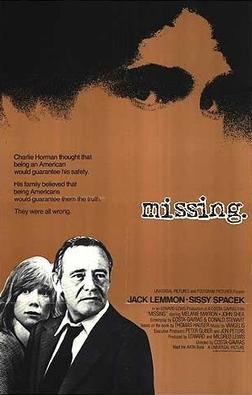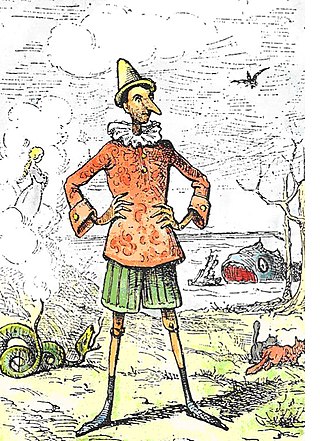Related Research Articles

Edmund Burke was an Anglo-Irish statesman and philosopher who spent most of his career in Great Britain. Born in Dublin, Burke served as a member of Parliament (MP) between 1766 and 1794 in the House of Commons of Great Britain with the Whig Party.

Bullshit is a common English expletive which may be shortened to the euphemism bull or the initialism B.S. In British English, "bollocks" is a comparable expletive. It is mostly a slang term and a profanity which means "nonsense", especially as a rebuke in response to communication or actions viewed as deceptive, misleading, disingenuous, unfair or false. As with many expletives, the term can be used as an interjection, or as many other parts of speech, and can carry a wide variety of meanings. A person who excels at communicating nonsense on a given subject is sometimes referred to as a "bullshit artist" instead of a "liar".

Missing is a 1982 American biographical thriller drama film directed by Costa-Gavras from a screenplay written by Gavras and Donald E. Stewart, adapted from the book The Execution of Charles Horman: An American Sacrifice (1978) by Thomas Hauser, based on the disappearance of American journalist Charles Horman, in the aftermath of the United States-backed Chilean coup of 1973, which deposed the democratically elected socialist President Salvador Allende.
Deception is an act or statement that misleads, hides the truth, or promotes a belief, concept, or idea that is not true. This occurs when a deceiver uses information against a person to make them believe an idea is true. Deception can be used with both verbal and nonverbal messages. The person creating the deception knows it to be false while the receiver of the message has a tendency to believe it. It is often done for personal gain or advantage. Deception can involve dissimulation, propaganda and sleight of hand as well as distraction, camouflage or concealment. There is also self-deception, as in bad faith. It can also be called, with varying subjective implications, beguilement, deceit, bluff, mystification, ruse, or subterfuge.

A cover-up is an attempt, whether successful or not, to conceal evidence of wrongdoing, error, incompetence, or other embarrassing information. Research has distinguished personal cover-ups from relational cover-ups.

Sir James Mackintosh FRS FRSE was a Scottish jurist, Whig politician and Whig historian. His studies and sympathies embraced many interests. He was trained as a doctor and barrister, and worked also as a journalist, judge, administrator, professor, philosopher and politician.

A lie is an assertion that is believed to be false, typically used with the purpose of deceiving or misleading someone. The practice of communicating lies is called lying. A person who communicates a lie may be termed a liar. Lies can be interpreted as deliberately false statements or misleading statements, though not all statements that are literally false are considered lies – metaphors, hyperboles, and other figurative rhetoric are not intended to mislead, while lies are explicitly meant for literal interpretation by their audience. Lies may also serve a variety of instrumental, interpersonal, or psychological functions for the individuals who use them.

"Lies, damned lies, and statistics" is a phrase describing the persuasive power of statistics to bolster weak arguments, "one of the best, and best-known" critiques of applied statistics. It is also sometimes colloquially used to doubt statistics used to prove an opponent's point.
The Dershowitz–Finkelstein affair was a public controversy involving academics Alan Dershowitz and Norman Finkelstein and their scholarship on the Israeli–Palestinian conflict in 2005.

Edward Thurlow, 1st Baron Thurlow, PC, was a British lawyer and Tory politician who sat in the House of Commons from 1765 to 1778 when he was raised to the peerage as Baron Thurlow. He served as Lord High Chancellor of Great Britain for fourteen years and under four Prime Ministers.
Peter Maurice Wright CBE was a principal scientific officer for MI5, the British counter-intelligence agency. His book Spycatcher, written with Paul Greengrass, became an international bestseller with sales of over two million copies. Spycatcher was part memoir, part exposé detailing what Wright claimed were serious institutional failures he investigated within MI5. Wright is said to have been influenced in his counterespionage activity by James Jesus Angleton, counter-intelligence chief of the US Central Intelligence Agency (CIA) from 1954 to 1975.

Arthur Augustus William Harry Ponsonby, 1st Baron Ponsonby of Shulbrede, was a British politician, writer, and social activist. He was the son of Sir Henry Ponsonby, Private Secretary to Queen Victoria, and Mary Elizabeth Bulteel, daughter of John Crocker Bulteel. He was also the great-grandson of The 3rd Earl of Bessborough, The 3rd Earl of Bathurst and The 2nd Earl Grey. The 1st Baron Sysonby was his elder brother.

Reflections on the Revolution in France is a political pamphlet written by the British statesman Edmund Burke and published in November 1790. It is fundamentally a contrast of the French Revolution to that time with the unwritten British Constitution and, to a significant degree, an argument with British supporters and interpreters of the events in France. One of the best-known intellectual attacks against the French Revolution, Reflections is a defining tract of modern conservatism as well as an important contribution to international theory. The Norton Anthology of English Literature describes Reflections as becoming the "most eloquent statement of British conservatism favoring monarchy, aristocracy, property, hereditary succession, and the wisdom of the ages." Above all else, it has been one of the defining efforts of Edmund Burke's transformation of "traditionalism into a self-conscious and fully conceived political philosophy of conservatism".

Robert Temple Armstrong, Baron Armstrong of Ilminster, was a British civil servant and life peer.
Terminological inexactitude is a phrase introduced in 1906 by British politician Winston Churchill. It is used as a euphemism or circumlocution meaning a lie, an untruth, or a substantially correct but technically inaccurate statement.
A half-truth is a deceptive statement that includes some element of truth. The statement might be partly true, the statement may be totally true, but only part of the whole truth, or it may use some deceptive element, such as improper punctuation, or double meaning, especially if the intent is to deceive, evade, blame or misrepresent the truth.
"Peace with Honor" was a phrase U.S. President Richard Nixon used in a speech on January 23, 1973 to describe the Paris Peace Accords to end the Vietnam War. The phrase is a variation on a campaign promise Nixon made in 1968: "I pledge to you that we shall have an honorable end to the war in Vietnam." The Accords specified that a ceasefire would take place four days later. According to the plan, within sixty days of the ceasefire, the North Vietnamese would release all U.S. prisoners, and all U.S. troops would withdraw from South Vietnam. On March 29, 1973, the last U.S. soldier left Vietnam. On 30 April 1975, Saigon was taken by North Vietnamese troops.

Samuel Langhorne Clemens , well known by his pen name Mark Twain, was an American author and humorist. Twain is noted for his novels Adventures of Huckleberry Finn (1884), which has been called the "Great American Novel," and The Adventures of Tom Sawyer (1876). He also wrote poetry, short stories, essays, and non-fiction. His big break was "The Celebrated Jumping Frog of Calaveras County" (1867).

Robert-François Damiens was a French domestic servant whose attempted assassination of King Louis XV in 1757 culminated in his public execution. He was the last person to be executed in France by dismemberment, the traditional form of death penalty reserved for regicides.
References
Sources
- Durant, Alan (1996). "On the interpretation of allusions and other innuendo meanings in libel actions: the value of semantic and pragmatic evidence" (PDF). International Journal of Speech, Language and the Law. 3 (2): 195–210. doi:10.1558/ijsll.v3i2.195. ISSN 1748-8885 . Retrieved 16 April 2015.
- Knowles, Elizabeth, ed. (23 August 2007). Oxford Dictionary of Modern Quotations (3rd ed.). Oxford University Press. ISBN 9780199208951 . Retrieved 16 April 2015.
Footnotes
- ↑ Hencke, David (20 June 2002). "Tobacco giant in illicit sales query". The Guardian. Retrieved 24 April 2022.
- 1 2 3 Oxford Dictionary of Modern Quotations 2007, p. 14 no. 12
- ↑ Beckett, Francis (14 April 2003). "A perfect spy" . NewStatesman . "... Rose points out indignantly, goes back to Edmund Burke."
- ↑ Burke, Edmund (1796). "Letter I". Two letters addressed to a member of the present Parliament, on the proposals for peace with the regicide directory of France. London: Rivington. p. 137.
- ↑ Burke, Edmund (1999) [1878]. "Letter I: On the Overtures of Peace". In Payne, Edward John (ed.). Letters on a Regicide Peace [1795]. Select Works of Edmund Burke. Vol. 3. Foreword by Francis Canavan (A New Imprint of the Payne ed.). Indianapolis: Liberty Fund. p. 151.
- ↑ Shell, Marc (1 September 1993). The Economy of Literature. JHU Press. p. 106. ISBN 9780801846946 . Retrieved 16 April 2015.
- ↑ Newman, John Henry (1865). "Apologia pro Vita Sua (1865) – Note F. On Page 269. The Economy". Newman Reader. Retrieved 16 April 2015.
- ↑ Twain, Mark (1897). "Following the Equator: Pudd'nhead Wilson's New Calendar". Mark Twain in His Times. University of Virginia. Retrieved 16 April 2015.
- ↑ Leavenworth, Charles S. (1901). "The Dawn of Peace". The Arrow War with China. London: Sampson Low, Marston & Co. p. 208.
Mark Twain once said, " Truth is the most valuable thing we have. Let us economize it ! " But there is no necessity to be economical with the truth about the motives of the Cabinets of the world.
- ↑ "The Iron and Metal Trades; Birmingham". The Iron Age. 57. Chilton Company: 28. 14 January 1897.
If you can't say its dead dull with them, one can say without being economical with the truth that they are in a condition of "masterly inactivity."
- ↑ "[McNall, Superintendent, Scolds the Insurance Press]". The Weekly Underwriter. 56 (24): 413. 12 June 1897.
The insurance superintendent of Kansas is said to be very economical with the truth. That certainly is not because of his reticence for he is much given to words.
- ↑ Parliamentary Debates: House of Representatives. New Zealand. 26 June 1923. p. 299.
I would advise them to think of this : that it is not well to be too economical with the truth – nothing should be suppressed.
{{cite book}}: CS1 maint: location missing publisher (link) - ↑ Chaplin, Alexander Dew (5 May 1926). "House of Commons Debates". p. 3137. Retrieved 16 April 2015.
Now, these triplets of truth are very economical with the truth, and if they made such statements in any private business they would not last long.
- ↑ Dalkeith, Earl of (4 July 1968). "PRIME MINISTER (TELEVISION BROADCAST)". HC Deb. vol 767 c1690. Retrieved 16 April 2015.
would he openly admit that he either made a gross miscalculation, misled the people or at best had been over-economical with the truth?
- ↑ Brickhill, Paul (2000) [1950]. "Aftermath" . The Great Escape. London: Cassell. p. 256. ISBN 9780304356874.
the Russians took him to see Scharpwinkel, a dark, ruthless man whom the Russians persuaded to speak. Though Scharpwinkel himself was economical with the truth, the details he gave implicated Wielen, and ... bit by bit the truth came out.
- ↑ Durant 1996, p.4
- ↑ Durant 1996, pp.4–5
- ↑ Ellis, Bob (4 May 2009). And So it Went. Penguin Books Limited. p. 150. ISBN 9780857966025 . Retrieved 16 April 2015.
- ↑ Trewin, Ion (14 September 2009). "Ch. 19: Behind the actualité". Alan Clark: The Biography. Orion. ISBN 9780297857822 . Retrieved 16 April 2015.
- ↑ Oxford Dictionary of Modern Quotations 2007, p. 70 no.6
- ↑ Durant 1996